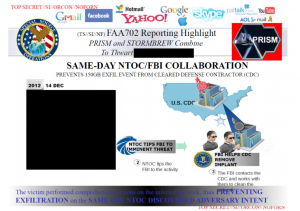Man, it looks Mike Rogers and Keith Alexander conducted one hell of an InfoOp against the nation’s NatSec journalists today. Congratulations, spooks, you’ve finally managed successful propaganda.
Before I explain what I understand to have happened, let me be clear: I don’t claim to know what the slides and Q&A from Boundless Informant mean. It may well be that the truth lies between what a bunch of reporters are now reporting and what a series of papers around the world have reported. What I am focusing on here is what the I Con has said as compared to how it has been reported.
As I noted last week, James Clapper used a poor translation of a French article which clearly talked about collecting metadata, denied that the NSA was collecting call content, and based on that gimmick claimed Le Monde had made an error.
Then, in remarkable timing that has been replicated several times during this scandal, the WSJ reported just before the hearing on a topic that both Mike Rogers and Keith Alexander had rehearsed answers for during the hearing. I believe the original lede of the WSJ story (it has been updated) read the same as the current article does,
Millions of phone records at the center of a firestorm in Europe over spying by the National Security Agency were secretly supplied to the U.S. by European intelligence services—not collected by the NSA, upending a furor that cast a pall over trans-Atlantic relations
I don’t think the story ever said all the records were collected by Europeans, just that millions were. But in any case, I have zero doubt that WSJ’s secret sources told them something like this, that Europeans gave us data, which got reported in a way to suggest the Europeans collected all of it.
At the end of a long sequence in the hearing itself, in a comment not read from prepared statement, Alexander said this (all transcriptions here my own — please let me know of any errors):
Those screen shots that show–or at least, lead people to believe that we, NSA, or the United States, collected that information is false. And it’s false that it was collected on European citizens. It was neither.
And that statement, which did not accord with what Alexander had just said (including a long passage read from a prepared statement), resulted in headlines like this:
NSA Chief Says Phone Records Given to Agency by Cooperating European Intelligence Services, Not Intercepted by NSA
Or, from the WSJ’s update, making this conclusion:
In a congressional hearing Tuesday, the National Security Agency director, Gen. Keith Alexander, confirmed the broad outlines of the Journal report, saying that the specific documents released by Mr. Snowden didn’t represent data collected by the NSA or any other U.S. agency and didn’t include records from calls within those countries.
I think one of the reasons this InfoOp worked so well is that reporters had almost no time between the hearing and their filing deadline to review what actually got said (I tweeted immediately that Alexander’s statement actually didn’t confirm the WSJ’s early report, but am only now getting this all down).
So let’s look carefully at what Alexander really said (this starts at 41:14).
Rogers starts by asking Alexander to elaborate, specifically with regards to the US and NSA (he may be invoking the WSJ story, but he doesn’t say so).
Rogers: And to that end, if I can, Mr. Alexander, there was some reporting that the story about French citizens being spied on by a particular slide that was leaked on a slide deck concluded that French citizens were being spied on. Can you expound on that a little bit? By the United States, by the way, specifically the National Security Agency.
Reading from a document of some sort, Alexander repeats the gimmick Clapper used last week, suggesting that the reports said the NSA had collected phone calls (content), then “corrects” their report to say Boundless Informant actually tracks metadata (which is actually what the reports had said).
Alexander: Chairman, the assertions by reporters in France, Le Monde, Spain, El Mundo, and Italy, L’Espresso, that NSA collected tens of millions of phone calls are completely false. They cite as evidence screen shots of the results of a web tool used for data management purposes but both they and the person who stole the classified data did not understand what they were looking at. The web tool counts metadata records from around the world and displays the totals in several different formats. [my emphasis]
Alexander then adds to last week’s gimmick of claiming the Europeans reported these as calls, not metadata, by denying we, alone, collected this data.
The sources of the metadata include data legally collected by NSA under its various authorities as well as data provided to NSA by foreign partners. To be perfectly clear, this is not information that we collected on European citizens. It represents information that we and our NATO allies have collected in defense of our countries and in support of military operations.
This is not information “we” collected (on European citizens, but I’ll come back to that), it’s data “collected by NSA … as well as data provided … by foreign partners.” It’s data “we and our NATO allies have collected.”
Those conjunctions — “as well as” … “and” — which in Alexander’s written statement make it clear that both the Europeans and US collect this intelligence, disappeared from much of the reporting on this.
Read more →

